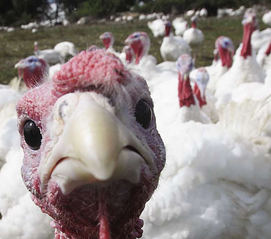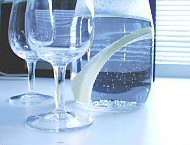Turkeys not just for Christmas - farm case study
Amended July 2024
In this case study a routine sample detects fowl play.
As part of its routine statutory monitoring, rather than in response to a customer compliant, a water company in Wales identified a sample collected from a domestic property failing taste and odour requirements. The sample was fully compliant in all other respects. Although this particular water quality failure was not considered by the company to be a risk to health, in line with its policy, an investigation involving various different specialist teams was carried out. This process involved water sampling of other properties in the surrounding area, which found no evidence of taste and odour issues associated with the failed sample.  Also, in recognition that the plumbing within the property could be a factor, the Water Quality team scheduled an immediate water fittings inspection.
Also, in recognition that the plumbing within the property could be a factor, the Water Quality team scheduled an immediate water fittings inspection.
Having carried out a water fittings inspection of the bungalow affected, the Regulations Inspector did not to identify any contravention inside the property, so they quickly diverted their attention to the exterior where they identified a number of poultry units.
Here they discovered a cross connection between the mains water supply and a borehole, the mains supply being intended as a backup should the private supply fail. No backflow protection had been installed and the water supplies were only separated by means of an isolation valve, closed at the time of inspection. Added to this they were able to determine that the back-up supply was fed via approximately 80 metres of pipe (between a tee off the supply pipe feeding the bungalow and the cross connection). This length of pipe was considered likely to be holding stagnant water.
Having identified this infringement as the likely cause of the water quality failures the Regulations Inspector provided the customer with a detailed explanation of what they had found.
They also explained the need to carry out remedial work to the existing plumbing arrangements in order to comply with the Water Supply (Water Fittings) Regulations 1999 before duly serving an infringement notice. The Regulations Inspector also informed the customer that the cross connection needed to be disconnected and their system flushed as a matter of urgency.

To help ensure no reoccurrence of the problem the Regulations inspector also took time to describe what forms of backflow protection would be required should the customer wish to retain the mains water backup to supplement their borehole supply. The customer’s decision to keep the mains supply backup but ensure that the arrangement complied with the Water Fittings Regulations was confirmed at a follow up inspection and subsequent samples were fully compliant with the Water Quality Regulations.
This incident has served to highlight not only the need, but also the benefits of why water companies include water fittings inspections as part of the procedure for dealing with water quality issues.

